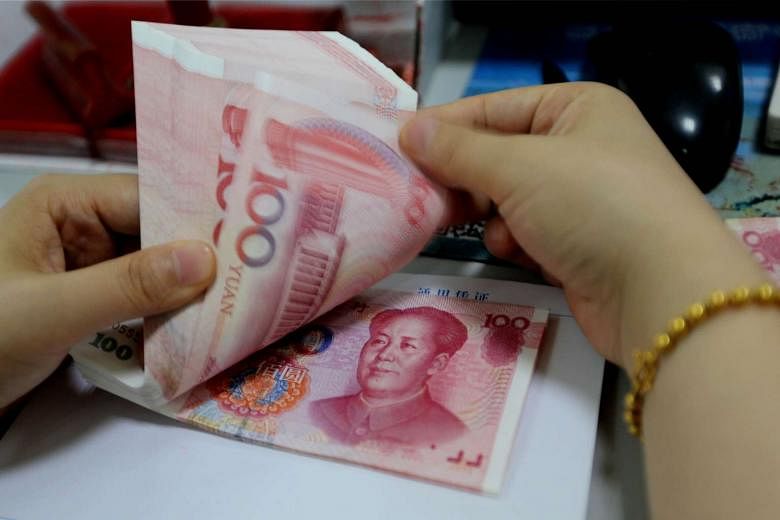SHANGHAI (AFP, BLOOMBERG, REUTERS) - China cut the yuan's value against the US dollar for the second consecutive day Wednesday, roiling global financial markets and driving expectations the currency could be set for further falls.
The daily reference rate that sets the value of the Chinese currency against the greenback was cut by 1.62 per cent to 6.3306 yuan, from 6.2298 the previous day, the People's Bank of China (PBoC) said in a statement on its website.
The move took the reductions to 3.5 per cent this week - the largest in more than two decades - after a surprise cut on Tuesday, but the central bank played down expectations it would continue to depreciate the currency.
The combined drop is the biggest since China set up its modern foreign exchange system in 1994. It is also a bigger change than the 2.1 per cent rise when China unpegged the yuan, also known as the renminbi (RMB), from the dollar in 2005.
The move has been widely viewed as a way to help boost exports by making them more competitive as growth slows, although China's central bank described it as part of reforms to make its exchange rate system more market-oriented.
The cuts have jolted global share and commodity markets, with jitters spreading on Wednesday as investors fretted over the possible impact on economies closely tied to the Asian giant.
Singapore's benchmark interest rate jumped to a four-month high on Wednesday, after the Singapore dollar slid to a five-year low against the US dollar. The three-month Singapore interbank offered rate (Sibor), which is used to set interest rates on mortgages, surged 5.5 basis points from Tuesday to 0.9345 per cent, its highest level since April 16.
The Malaysian ringgit fell to its weakest against the Singdollar on record, trading at 2.8538 to the Singdollar at about 1:35pm, down from its close at 2.82 on Tuesday.
Singapore shares suffered the biggest one-day fall this year, crashing as much as 2.95 per cent or 93.3 points to 3,059.76 as trading opened. As at 2:36 pm, the Straits Times Index was down 82.80 points or 2.63 per cent to 3,070.17.
Chinese authorities maintain strict controls on the currency, but they have made repeated pledges to liberalise the rules. The central bank described Tuesday's cut as a one-off depreciation.
The US government, long a critic of China's rigid currency regime, offered a mild response saying it was too early to judge the move, despite previous comments by officials that the yuan is undervalued.
"China has indicated that the changes announced today are another step in its move to a more market-determined exchange rate," the US Treasury said, adding that "any reversal in reforms would be a troubling development".
Analysts said the move could also delay expected moves by the United States to raise interest rates and even threaten a currency war as other countries come under pressure to devalue as well.
China's central bank sought to reassure financial markets on Wednesday that it was not embarking on a steady depreciation of its currency, saying in a statement on its website, "Looking at the international and domestic economic situation, currently there is no basis for a sustained depreciation trend for the yuan."
Previously, Chinese authorities based the fixing on a poll of market-makers, but the PBoC said Wednesday they will now also take into account the previous day's close, foreign exchange supply and demand and the rates of major currencies.
Wednesday's fix was even lower than Tuesday's close of 6.3232 yuan to the dollar, and the unit weakened further on the domestic market to 6.4230.
SG Global Economics said in a research report that it saw a "bias for further depreciation" in the yuan, extending to five per cent over 12 months.
But the PBoC dismissed expectations of continued falls, saying the movements in the yuan exchange rate were normal.
"From the international and domestic economic and financial situation, currently there is no base for continued depreciation of the RMB exchange rate," the bank said in a statement.
The cuts roiled Asian shares Wednesday, with Hong Kong and Tokyo all losing more than one per cent, while oil continued its slide after hitting a more than six-year low in New York.
At midday, Shanghai stocks were down 0.45 per cent on expectations the move will cause capital outflows from China, adding to worries over the weak economy.
China allows the yuan to trade only within a two per cent range on either side of the daily reference rate, although the State Council, or cabinet, has signalled it intends to widen the band.
"In the long-term, the band will widen along with the marketisation (of the yuan)," Liu Dongmin, director of international finance research office at the Chinese Academy of Social Sciences, told AFP.
China is also seeking to have the yuan included in the International Monetary Fund's basket of "special drawing rights" (SDR) reserve currencies.
The IMF has said more work was required on the proposal, but a spokesman welcomed Tuesday's changes, saying they should give market forces "a greater role in determining the exchange rate".
"Greater exchange rate flexibility is important for China as it strives to give market forces a decisive role in the economy and is rapidly integrating into global financial markets," the spokesman added.
"The exact impact will depend on how the new mechanism is implemented in practice."

